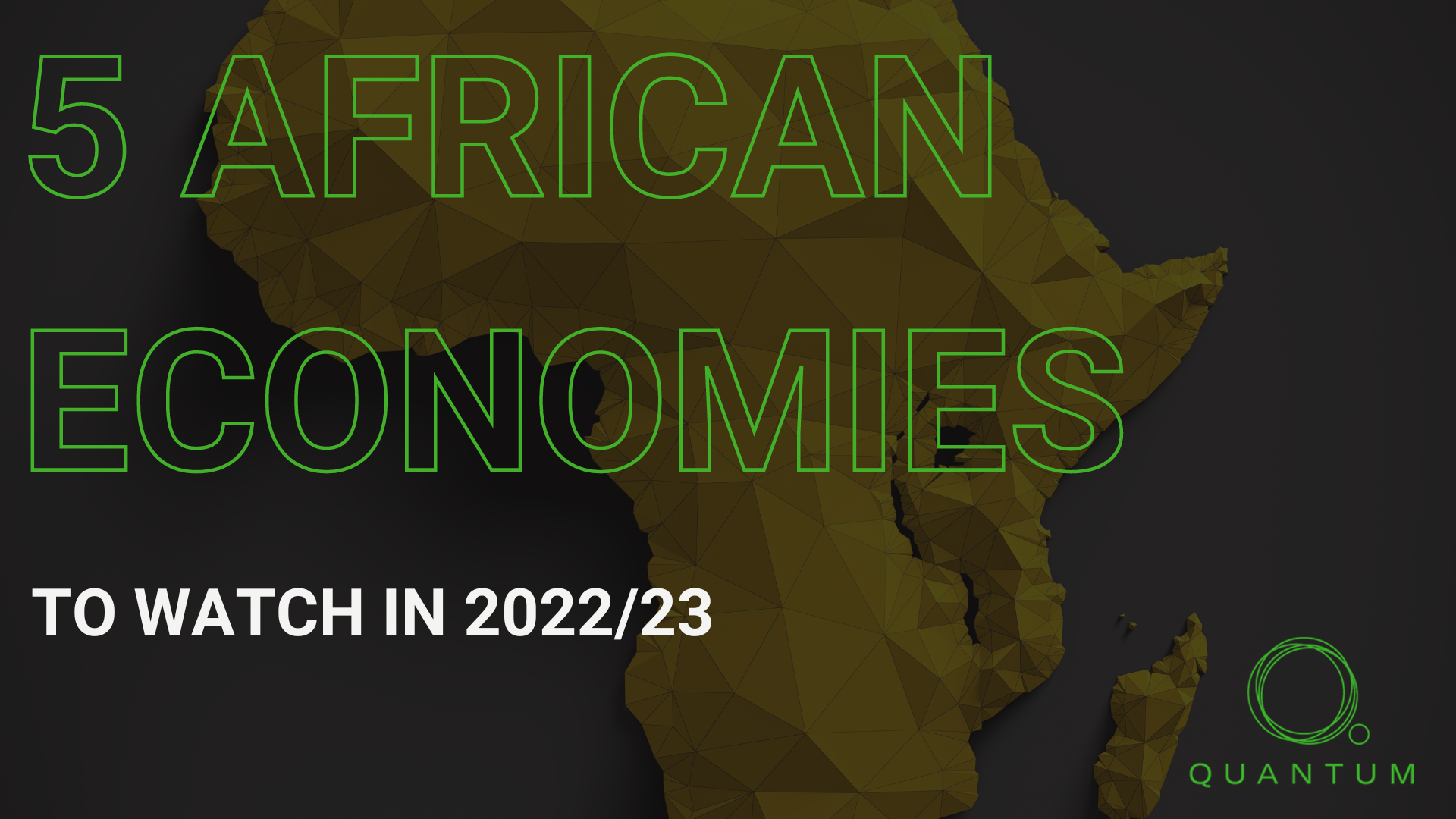5 African Economies to watch in 2022/23
Published on
05 September 2022


Sources across the web say that the impact of the war in Ukraine is weighing on the global economic recovery from the pandemic. Yet many African nations are still seeing GDP growth in 2022, even if the figures are lower than in 2021. Here is an introduction to 5 African Countries to watch in 2022/23.
Morocco

Region: North Africa
GDP growth 2021: 4.5%
Sectors feeding economic growth
- Agriculture: contributes 11.7% to GDP and employs 33.2% of the workforce
- Industry: contributes 26.1% of GDP and employs 23% of workforce. Main sectors include oil refinery and electronic assembly, but emerging sectors seeing growth include automotive, chemistry, renewable energy and aerospace.
- Phosphate mining: employs 2% of population but contributes half of the nation’s income.
Programmes of interest
Generation Green
Generation Green 2020-2030 is a programme aimed at helping the Moroccan agricultural sector to reach new levels of development through the emergence of a new generation of agricultural middle class and young entrepreneurs, creating 350,5000 jobs and developing millions of hectares of arable land. The strategy includes a plan to repopulate 133,000ha of forest.
The Noor Ouarzazate Solar Complex
Morocco aims to generate 52% of its electricity from renewable energy by 2030. The Noor Ouarzazate Solar Complex, a three-phase renewable energy complex, is the worlds largest concentrated solar power plant.
Ghana

Region: West Africa
GDP growth 2021: 4.6%
Sectors feeding economic growth
- Mining: Ghana has recently overtaken South Africa as the Africa’s largest producer of gold. The mining workforce tripled between 2018 and 2020 to 35,000, and government programmes aim to create an additional 220,000 jobs by the end of 2022.
- Tech: Ghana is investing in growing its Information and Communication Technology sector through Digital Infrastructure, Software, Fintech, Healthtech and Edtech.
Programmes of interest
Green Growth for Jobs
Ghana will focus on creating a green economy by mitigating climate change and addressing gender inequality. A greener economy means new growth and job opportunities according to a circular and sustainable model.
Smart and Sustainable Cities
Ghana is working on developing their secondary cities and regional capitals into smart sustainable cities by focusing on digitalisation, domestic resource mobilisation, and sustainable urban planning and infrastructure.
More information on programmes of interest in Ghana
Nigeria

Region: West Africa
GDP growth 2021: 3.6%
Sectors feeding economic growth
Nigeria has the largest economy in Africa, with the fastest growing industries including Information and Communication Technology, Construction, Energy and Construction.
Historically, Oil and Agriculture have been major drivers of the Nigerian Economy, but climate change is impacting both industries.
- As Europe strives for Net-Zero carbon emissions by 2050, Nigeria saw an 8% contraction in the oil sector, which is expected to reverse in 2022 in answer to the disruptions in Russian oil supply.
- Growth in Agriculture is also expected to decelerate due to declining crop yields.
Programme of interest
In answer to these economic changes, there is an estimated $177 Billion financing for clean energy, smart agriculture, and climate-proofing technology.
Botswana

Region: Southern Africa
GDP growth 2021: 7.5%
Sectors feeding economic growth
- Renewable Energy: Botswana aims to be a net exporter of electricity by 2027. They are developing a mega solar project that will make Botswana one of the most significant producers and exporters of Solar Power
- Mining: The mining sector accounts for about 35 per cent of GDP, with diamonds contributing about 94 per cent of the total mining share in GDP.
Programmes of interest
UN Sustainable Development Goals
The Sustainable Development Goals are a global call to action to end poverty, protect the earth’s environment and climate, and ensure that people everywhere can enjoy peace and prosperity. Read more about Botswana’s Sustainable Development Goals here.
Towards Sustainable Mining®
The Botswana Chamber of Mines has adopted a corporate social responsibility program developed by the Mining Association of Canada (MAC) to improve environmental and social practices in the mining industry.
Transformation Agenda
Although Botswana was one of the poorest countries in the world following independence in 1966, significant mineral wealth, good governance and prudent economic management have turned Botswana into an upper-middle income country, with an agenda to become a high-income country by 2036.
Kenya

Region: East Africa
GDP growth 2021: 7.6%
Sectors feeding economic growth
- Fintech: Bloomberg attributes Kenya’s better-than-forecast first quarter to their financial services industry. Kenya’s capital, Nairobi, has been dubbed “Silicon Savannah” due to its strong tech ecosystem, as reported by Fintech Times’ examination of the Kenyan Fintech Ecosystem.
- Renewable Energy: Kenya aims to have completed a full transition to renewable Energy by 2030. This from President Uhuru Kenyatta at COP26 in Glasgow 2021, where he reported that 73% of Kenya’s installed power generation capacity while 90% of electricity in use is from green sources among them geothermal, wind, solar and hydro-electric installations.
- Manufacturing: Manufacturing, which is one of the four pillars of the Big Four Agenda, was allocated Ksh10.1 Billion (approximately £70 Million) in the 2022/2023 budget, with £4.4 Million reserved for the financing of SME’s through the Kenya Industrial Estate (Source: Kenyan Wall Street).
Programmes of interest
“The Kenya Vision 2030 aims to transform Kenya into a newly industrializing, middle-income country providing a high quality of life to all its citizens by 2030 in a clean and secure environment.” The sectors that have been identified as optimal for achieving Vision 2030 are Tourism, Agriculture and Livestock, Wholesale & Retail, Trade, Manufacturing, Financial Services, Business Process Offshoring and IT-Enabled Services.
Recruiting in Africa?
Contact João, our Regional Partner for Africa, on JCCosta@quantumsas.com or connect with him on LinkedIn to talk about your next role.

